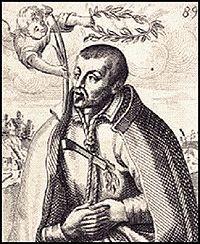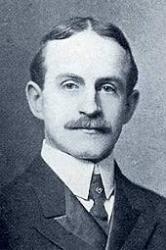Planning worship?
Check out our sister site, ZeteoSearch.org,
for 20+ additional resources related to your search.
- |
User Links
Person Results
Gerard T. Noel

1782 - 1851 Author of "If Human Kindness Meets Return" in The Cyber Hymnal Gerard Thomas Noel was born in 1782. His studies were pursued at the Universities of Edinburgh and Cambridge. He graduated M.A. from Trinity College, Cambridge. He was successively Curate of Radwell, Vicar of Rainham, and Curate of Richmond. In 1834, he was Canon of Winchester, and in 1840, Vicar of Romsey, were he died in 1851. He published some Sketches of Travel, and a Selection of Psalms and Hymns.
--Annotations of the Hymnal, Charles Hutchins, M.A. 1872.
===================
Noel, Hon. Gerard Thomas, M.A., elder brother of the Hon. Baptist W. Noel, was born Dec. 2, 1782, and educated at Edinburgh and Cambridge. Taking Holy Orders, he held successively the curacy of Bad well, Hertfordshire, the Vicarages of Rainham and Romsey, and a Canonry in Winchester Cathedral. He died at Romsey, Feb. 24, 1851. His published works include Fifty Sermons for the Use of Families, 1830; Sermons preached in Romsey, 1853; and Arvendel, or Sketches in Italy and Switzerland, 1813. In this last work some of his earlier hymns appeared.
He also compiled:—
A Selection of Psalms and Hymns from the New Version of the Church of England and others; corrected and revised for Public Worship, London, J. Hatchard, 1810. In this Selection he gave a few hymns of his own, but anonymously. The 3rd edition, 1820, is enlarged, and has an Appendix of 17 hymns. Three of his hymns are in common use:—
1. If human kindness meets return. Jesus the Friend. This appeared in his Arvendel, &c, and his Selection of Psalms & Hymns, 1810, No. 45. It is in extensive use.
2. Stamped as the purpose of the skies. Missions. This is found in the February number of the Christian Observer, 1810, in 6 stanzas of 4 lines, and is signed "N." In his Selection of Psalms & Hymns, 1810, No. 48, and in the 3rd edition, 1820, No. 174, it begins "Mark'd as the purpose of the skies." In this form it is known to the modern collections.
3. When musing sorrow weeps [mourns] the past. Desiring Heaven. Given in the second edition of his Selection 1813, No. 48.
--John Julian, Dictionary of Hymnology (1907)
Gerard T. Noel
Jay T. Stocking
1870 - 1936 Author of "偉大工匠,萬族之表,
(O Master Workman of the race)" in 生命聖詩 - Hymns of Life, 1986 Clergyman; held posts at various NE churches; d. St. Louis, Mo.
Jay T. Stocking
John Campbell Shairp
1819 - 1885 Author of "From Noon of Joy to Night of Doubt" in Rejoice in the Lord Shairp, John Campbell, LL.D., s. of Major Norman Shairp, was b. at Houstoun, West Lothian, July 30, 1819; student at the Univ. of Glasgow 1836-9; Snell Exhib., Balliol College Ox., 1840, and Newdigate Prize 1842. For a time he was assistant master at Rugby, then Professor of Latin at St. Andrews 1861; Principal of the United Coll., St Andrews, 1868, and Prof, of Poetry, Oxford, 1877. He died at Ormsary, Argyllshire, Sept. 18, 1885. The LL.D. was conferred upon him by the University of Edinburgh in 1884. His hymn:—
Twixt gleams of joy and clouds of doubt. [God the Unchangeable.] Appeared in his Glen Desseray and other Poems, 1888, p. 265, and marked as having been written in 1871. It is in several collections, especially in America (e.g. The Pilgrim Hymnal, 1904). Also in Horder's Worship Song, 1905. The cento, "Let me no more my comfort draw," in Sursum Corda, 1898, is from this hymn.
--John Julian, Dictionary of Hymnology, New Supplement (1907)
John Campbell Shairp
Robert Southwell

1561 - 1595 Person Name: Robert Southwell, 1560-1595 Author of "Let folly praise that fancy loves" in Hymns of the Kingdom of God Southwell, Robert, was b. at Horsham St. Faith, Norfolk, about 1561, educated at Paris and at Rome, and entered the Society of Jesus at Rome, Oct. 17, 1578. He spent part of his noviciate at Tournai in Belgium, but returned to Rome and completed his studies there. After being ordained priest in 1584, he returned to England in 1586. He was arrested in 1592 on the charge of high treason, committed to the Tower of London, formally tried at Westminster, Feb. 21, 1594-5, and executed the next day at Tyburn.
His Poetical Works were collected in 1856 by W. B. Turnbull, and re-edited in 1872 more completely and more carefully by Dr. A. B. Grosart, from the Add. manuscript 10422 in the British Museum, from a manuscript, perhaps autograph, at Stonyhurst College, Lanes., and from the printed editions of the individual works. One of his carols is noted at p. 210, ii., one of his translations at p. 663, ii., three additional are in the Arundel Hymns, 1902. They are all in Grosart's edition and are here cited as they are found in the Add. 10422, the spelling being preserved:—
1. As I in hoarie winters nyght. [Christmas]. At f. 10 b. This is the admirable poem entitled "The Burning Babe."
2. Behoulde a seelie tender Babe. [Christmas.] At f. 11. See p. 210, ii.
3. In Paschall fest, ye ende of auntient rite. [Holy Communion.] At f. 17 b.
4. Let folly prayse that phaney loues. [Christmas.] At f. 9. The Arundel reads "what fancy loves."
5. Prayse, 0 Syon, prayse, prayse thy Saviour. At f. 16. From the "Lauda Sion," p. 663, ii.
See also notices in the Month for Oct. 1894, and Feb. and March 1895, and in the Dublin Review, Oct. 1903. [Rev. James Mearns, M.A.]
--John Julian, Dictionary of Hymnology, New Supplement (1907)
Robert Southwell
Calvin Weiss Laufer

1874 - 1938 Person Name: Calvin W. Laufer Author of "The world, dear Lord, is very large" in The Beacon Song and Service book Presbyterian minister and hymnographer Calvin Weiss Laufer was born today in Brodheadsville, Pennsylvania in 1874. Following his graduation from Union Seminary in 1900 he was ordained into the Presbyterian ministry and led congregations in New York and New Jersey for several years.
Laufer had a generally cheerful outlook on his Christian life, and his first two books, Key-Notes of Optimism (1911) and The Incomparable Christ (1914) expressed that viewpoint. A review of the first book spoke of the "crisp and stirring note in these sermonettes which is well calculated to rouse the mind of readers and banish dejection." His books were popular in their time but today are seen as somewhat superficial.
He later began to work with the Presbyterian Board of Christian Education and became its editor of musical publications, producing books such as The Junior Church School Hymnal (1927), The Church School Hymnal for Youth (1928) and When the Little Child Wants to Sing (1935). He was also the associate editor of the Presbyterian Hymnal of 1933, a very popular book which was used in many churches for more than fifty years.
In 1932, his book Hymn Lore was published, which contained the stories of fifty hymns from The Church School Hymnal for Youth, with information about their writers and composers (much like this blog). He chose a broad range of hymns, some quite modern and others well-known and loved for centuries. Several of them were by his mentor and friend Louis F. Benson, who had edited the Presbyterian Hymnal of 1895 and its 1911 revision (and also wrote The Best Church Hymns). In the preface to Hymn Lore, Laufer wrote:
To live with hymns and to make them one's own is the only sure way of appreciating their literary beauty and spiritual power. (...) That the reading and singing of hymns may become less mechanical, more thoughtful and intelligent, and emotionally more effective, this volume is released to the public.
Laufer wrote both hymn texts and tunes himself, most of which first appeared in the books he edited but also had some life outside Presbyterian circles. This tune was written while Laufer was attending a conference in Kansas, though with no particular text in mind. Not long after, he hummed it to a friend, William H. Foulkes, who then wrote the text "Take thou our minds, dear Lord."
Laufer's tune was originally called STONY BROOK, but he changed it to honor a friend, William Ralph Hall. Little is known about the writer May Pierpont Hoyt. Her text is generally sung to the tune BREAD OF LIFE by William F. Sherwin, but since that tune is more known with "Break thou the Bread of life," this text could use a different one.
--conjubilant.blogspot.com/2010/04/
Calvin Weiss Laufer
H. Kenn Carmichael
1908 - 1996 Author of "Today We All Are Called to Be Disciples" in Voices United H. Kenn Carmichael was born in Martins Ferry, 1908 and graduated from Muskingum College (B.A. 1938), the University of Wisconsin (M.A. in Speech, 1930), and the University of Minnesota (Ph.D. in Theater, 1941). He was head of the theatre department at Purdue University (1931-1943). From 1943 to 1946, Carmichael served in the U.S. Navy, where he made training films. After his enlistment ended, Carmichael taught at City College, Los Angeles (1947-1954), and then joined Film Production International producing films for denominational stewardship campaigns.
In 1962, Carmichael and his wife were commissioned by the Commission on Ecumenical Mission and Relations (COEMAR) of the United Presbyterian Church U.S.A. as consultants in communications to the Middle East and Africa. After ten years they returned to the United States, where Kenn became associate pastor at Central Church (1972-1979). Since 1979 the Carmichaels have lived at Westminster Gardens, Los Angeles.
Carmichael was Moderator of the Synod of Southern California and Hawaii in 1987. He was also honored as a distinguished alumnus by Muskingum College.
--The Presbyterian Hymnal Companion, 1993
H. Kenn Carmichael
L. I. Gentle
1904 - 1988 Person Name: Leonard Ivor Gentle Translator of "Dum klara nokto venis ĝi" in TTT-Himnaro Cigneta Leonard Ivor Gentle, an Englishman, was for 26 years the organist of the Londona Esperanta Diservo, for many years the best known Esperanto Protestant worship meeting. Four of his works appear in Adoru, and many others are accessible at the archived versions of TTT-Himnaro Cigneta (http://reocities.com/cigneto/thcbio/g/gentle_li.html)
Leland Ross
L. I. Gentle
Evelyn Atwater Cummins
1891 - 1971 Author of "I Know Not Where the Road Will Lead" in The Worshiping Church Born: May 17, 1891, Poughkeepsie, New York.
Died: August 30, 1971, Poughkeepsie, New York.
Cummins attended the National Cathedral School in Washington, DC, and the Masters School in Dobbs Ferry, New York. She married Alexander G. Cummins, rector of Christ Church in Poughkeepsie, New York. An active writer, she served as the associate editor (1926-46) and publisher (1946-47) of The Chronicle, and was also associated with The Living Church (1926-29), and the Poughkeepsie Evening Star (1940-43).
In the civic arena, Cummins served with the Poughkeepsie War Council, the Diocesan Board of Religious Education, the Federal Council of the Churches of Christ, the Visiting Nurses Association, the Young Women’s Christian Association, the Poughkeepsie City Library, and the Vassar Brothers Hospital. She became the first woman police commissioner in New York state, and was both police and fire commissioner in Poughkeepsie, and served on the police advisory board for the New York State Safety Division.
--www.hymntime.com/tch/
Evelyn Atwater Cummins
Anīs Maqdisī
1885 - 1977 Person Name: انيس الخوري المقدسي Author of "يا ساريا لا يهتدي" in كتاب الترانيم الروحية للكنائس الإنجيلية انيس الخوري المقدسي
ولد في طرابلس في لبنان.
كان قد تعلم في المدارس التبشيرية،
وعمل أستاذًا للغةِ العربية في الجامعة الأمريكية،
وكان عضو المجمع العلمي العربي في دمشق.
وكذلك عضو مجمع اللغة العربية في القاهرة منذ سنة 1961
Anis Khuri Makdisi
Anīs Maqdisī


 My Starred Hymns
My Starred Hymns


